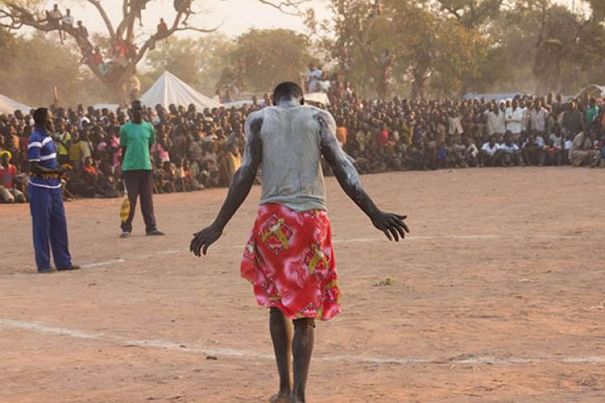Review: Beats of the Antonov
by Andrew Kaggwa

Beats of the Antonov is a film that documents the Sudan – SRF conflicts in the Nuba Mountains and the Blue Nile.
The film that’s directed and produced by Hajooj Kuka tends to focus on the role music has played to help harmonize the affected people, while using the same tool (music) to show us the other issues being faced.
Beats of the Antonov starts off by showing families running to take cover after the village is hit by bombs usually dropped by planes. Then we go on to see how people in the Blue Nile celebrate surviving death – they laugh it off- before we fully get used to it, we are immediately immersed into the sounds of the people. We meet their artistes, their ambitions, aspirations and learn why music means a lot to them –generally Kuka portraits a picture of music, culture and identity in times of war.
For some reason, Kuka presents the community as one that has gotten used to the bombings, they are part of the routine that they even await for them – the youth sing and dance in the night as they wait for the plane to come bomb and go. “If a plane attacked while people are sleeping, it would be devastating,” says the narrator.
In that way, it is the music that keeps them alert throughout the night. In one of the interviews, Kuka said the importance of using music, dance and laughter, was to show the world that despite what Sudan has gone through, they can still afford happiness.
And we see the high spirit show up in most parts of the film – through the wrestling celebrations, various jam sessions where music comes from instruments made out of metallic pipes, saucepans and plastic bags.
The film derives its name Antonov from fighter planes that we see dropping bombs at the beginning and one or two more scenes into the film.
Unlike many other films made about African crises, Beats of the Antonov doesn’t dwell so much on the infighting but rather a way the communities react to the crisis – this could be the reason why music and its various genres take the center stage. “Our songs are dedicated to the people of the blue Nile and all the displaced in Sudan from Nuba Mountains to Darfur,” says a musician.
In many of the performances captured by Kuka, there’s no clear separation between the artistes and the audience, it’s like this is the only time they generally feel the spirit of togetherness – the audience is part of the music and the music is part of the audience.
Most of the times, music is considered as tool of resistance against Arabinization that many people in the film blame on President Omar Bashir, the president in the North.
Thus, they sing to stay awake to see that the forces of Arabnization that come with Antonov don’t devastate them and in the same way forget their troubles while reminding themselves of who they are – their identities, values, norms and sports like wrestling.
In fact, in one of the scenes, Sarah Mohamed, a Sudanese Ethnomusicologist notes that in Khartoum the identities they bare are fake but Blue Nile is the truth; “This is a Sudan that is happy and lives a normal life.”
But even with the resilience, Kuka manages to show the audience the effects of such a war on the people of Nuba Mountains and the Blue Nile, some have developed a self-hate – the kind of mentality that if they looked different, no one would be attacking them.
Some women have applied creams that will make their skin complexions lighter, like those in the North, though much as they do it, none of them wishes the same for their sons or daughters.
Generally to sum the 68 minutes of Showtime, Beats of the Antonov is speaking to that African man that has forgotten their culture, that woman waiting for a ceremony to dust their traditional moves and garments – An Africa that has created a fake identity, leaving their authentic one to people in villages while they wonder with one that doesn’t know itself.

